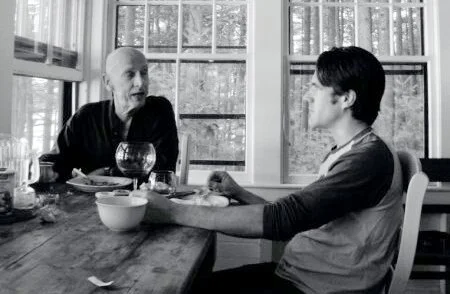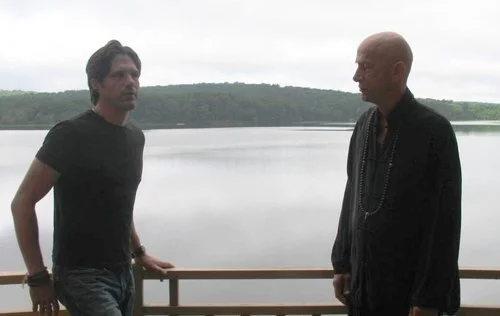First Interview with Jun Po
Jun Po Denis Kelly Roshi sits across from me on a rainy morning in Massachusetts in 2009, a black hood draped over his head. We are on the porch of an old lake home, overlooking a small stand of trees and then, through an opening in the underbrush, water. We are both holding steaming cups of coffee, and even though it is late June our hands huddle around the cups for warmth.
Jun Po’s eyes, intensely blue, stare past me at the distant memories I know he is conjuring, watching them take shape in his mind. We sit together, my digital recorder ready, notebook open with pen in hand; I wait in a measured silence as he searches for a place to begin.
Denis Kelly is tall and muscular with broad shoulders and a natural athleticism that defies his age, but his mass is now subdued, thoughtful, turned-in on itself. When he places his coffee cup on the table, I notice the hands of a laborer; broad and sinewy muscles wrap across large bones. There are pleats in his cheeks and deep lines etched into the skin around his mouth. The scars from radiation treatments a few years before make a red arc across his neck, as if he’s an old cowboy who somehow escaped the hangman’s noose. His is a face accustomed to wearing serious expressions, and seems most at home with slightly narrowed eyes and downturned lips, despite the fact I know he is prone to sudden laughter and frequent smiles. His eyes are intelligent and measured and hold no fear or hesitation. Like the water outside the window they are clear, deep, and still. The dark hood comes away from his face, exposing large ears and a large nose and a large chin that, taken together, create a rugged handsomeness that harkens back to some Dust Bowl farmer stoically working his land.
His 67 years show on his face, but the decades of daily yoga practice are hinted at in the deep masculinity and strength that emanates from his body. This is the first day of two weeks we are to spend together, two weeks in which he will go over the events of his extraordinary life in extraordinary detail, being candid to the point of making me occasionally squirm in my chair. I will come to understand that any discomfort is mine alone to bear for he long ago made peace with the demons and angels that gave him form and purpose.
“So,” I say, “I suppose we should start at the beginning.”
He considers for a long moment. When he finally speaks, his voice is a grumble, coming from somewhere deep in his belly, as if the story of his life will emanate from that place.
“Okay,” he says, his eyes briefly engaging mine before they find some undefined point in the ether behind me, “We have to go back to northern Wisconsin, back in the dark ages, in 1942. I have to start in utero, because my story begins with that trauma. My mother and my father had Rh-negative blood problems, and my older brother died in the hospital immediately after birth. I was born seven months later, and I still have that taste in my body of being created and nurtured and destroyed all at once by my mother, which set up a very interesting psychological profile.”
“Do you remember it,” I ask.
His head moves back on forth once. “No, but the feeling of that dichotomy — nurturing and destruction — is in my body. I didn’t work that out until I was in my fifties, didn’t understand that process. I could never quite crack the terror or intensity that was driving my basic narcissism. It was deeper than the trauma I had experienced in my youth ....”
I take notes furiously, and Jun Po settles back into his chair, interlacing his large fingers and resting his hands across his lap.
“What’s the first thing you remember?”
“Had to be forty-five or six,” he says after a pause, “Father was just back from the War. Nasty alcoholic. I was lying in a pool of my own piss, my little fat baby boy hands stuck out in front of me. In the next room, there’s an explosion of violence - screams and yelling, and I’m just trying to get away from it, and have backed myself under a bed. I stare out between my hands and my piss, trying to make sense of just what the fuck is going on in the next room, and then,” he snaps he fingers, “and then I’m gone, deep within the body in the most serene stillness you can imagine....”
I begin asking my questions: what did the house look like? Was there dust under the bed? What happened next? How did you view your father at that age?
His responses are calm and methodical, sometimes bordering on the lyrical. They are driven by the intensity that is this man, but there is little other emotion to animate them.
Over the next two weeks I will eventually become used to this; Jun Po’s descriptions of his life are at times unbearably sad and poignant, but he never once falters in his story, never dabs a tear from the corner of his eye, never has a quivering voice, and never once expresses much beyond a stoic wonder and a wry sense of humor and irony. Far from being repressed or detached from his emotions, I realize as our days together pass that he has already spent more than two decades of his life deconstructing them; many of these stories, once problematic, have become old friends full of their own hard wisdom. He welcomes them as such, mostly without valuation, although in a few areas he is harsh — almost cruel — in his assessment of himself.
His life has been almost unimaginably full; a world traveler, seeker of wisdom, ascetic, holder of vast wealth and power, lover of women, homeless mendicant, wanderer, fearless warrior, father and husband, spiritual adept, yogi, federal prisoner, family deserter, hedonist, Zen master. There are a dozen men that sit down with me every morning, but they are all contained within this man who has become Jun Po Roshi.
As of that meeting in June, we had known one another for two years, but I had never known him this way or this intimately. At the end of our two weeks together, I spent a long day reviewing my notes, and I realized something profound: I had been handed a story far richer and more incredible than I could have ever imagined. For this I am, and will always be, deeply grateful.
Order the book now from Amazon.


